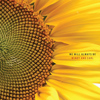 It has been several years since the last Windy & Carl album, but thankfully they are back and just as reliably excellent as ever.  Maybe even more so, as several of these songs easily stand with the duo's finest work.  Some long-term fans may be a little disappointed that they don't indulge their song-like or epic-length tendencies much this time around, but I doubt it: We Will Always Be largely sticks to what they do best  (beautifully glacial and glistening guitar) and does it warmly and purposefully.
It has been several years since the last Windy & Carl album, but thankfully they are back and just as reliably excellent as ever.  Maybe even more so, as several of these songs easily stand with the duo's finest work.  Some long-term fans may be a little disappointed that they don't indulge their song-like or epic-length tendencies much this time around, but I doubt it: We Will Always Be largely sticks to what they do best  (beautifully glacial and glistening guitar) and does it warmly and purposefully.
This album has quite an endearing and unusual origin story–it was never originally intended to be publicly released.  The story begins back in 2008, when Windy Weber released her first solo album, the uncharacteristically dark, caustic, and brooding I Hate People.  Urged on by their friends, Carl Hultgren decided to start work on his own solo effort, which he worked on for a year and a half, then presented to Windy as a gift for her alone.  When she told him that he should release it, he suggested that they make it a collaboration instead.  Consequently, We Will Always Be is essentially Carl's solo album enhanced by occasional cryptic and quiet, oft-whispered vocals from Windy.  Weber also contributes guitar to one (undisclosed) song, but her most significant contribution is as muse: Carl has rarely seemed more inspired and the blissed-out shimmer of these pieces serves as the perfect counterbalance to I Hate People.  Carl clearly loves people (at least one, anyway).  Equilibrium is restored.
The opening "For Rosa," however, is a notable departure from the rest of the album, as Windy languidly sings over an unprocessed, strummed acoustic guitar and some buried amplifier sizzle.  It is difficult to imagine a Windy-less version existing, but the remaining seven pieces are all very much devoted to Carl's shimmering, multilayered guitar heaven.  Obviously, that is pretty expected territory for Weber and Hultgren and they've covered it many times before (and quite beautifully).  Nevertheless, there are some subtle and less expected touches that elevate this album into something quite special.  For one, this sounds like ambient music, but it doesn't feel like it: these songs have a presence and restrained intensity to them that prevents them from fading into the background.  Secondly, there is a very rewarding and distinct arc to the sequencing.  The relatively brief early pieces are somewhat muted and static, but the songs grow steadily longer, better, more varied, and more intense as the album unfolds.  The final three pieces, in particular, are all absolutely mesmerizing and essential (albeit in Windy & Carl's characteristically understated way).
That propensity for understatement and subtlety serves the album well, as it makes the late album rough edges seem quietly devastating.  Those edges get their roughest on the closing 18-minute epic "Fainting in the Presence of the Lord," which is the unquestionable jewel of the album (and possibly their career).  I am not sure quite how the sounds are being made or who is making them, but it initially resembles a static-ravaged cat singing over a slowly intensifying bed of sacred-sounding organs.  Then  a slow-motion wave of gnarled, distorted guitar noise gradually envelops everything and it is wonderful.  I have rarely heard guitars used in a more poignant, heartbreaking manner: Hultgren evokes mingled feelings of anguish and ecstasy that words could not possibly hope to convey.  Such a spectacular crescendo necessarily makes the rest of the album seem a bit pale in comparison, but the less-intense "Nature of Memory" is another huge highlight.  Without those two pieces, We Will Always Be would already be a very good Windy & Carl album.  With them, it is easily among their best.
Samples:
 
 
Read More


